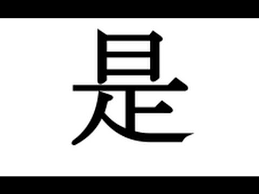 First off, when does the verb “to be” stick around in Chinese? 1. Use 是 (shì) to connect two nouns 是 (shì) is used like the English verb “to be” when you want to connect two nouns (or pronouns) together in a sentence to explain what something, or someone, is: 我是美国人。(wǒ shì měi guó rén – I am an American.) Literally: American person Just like English, right ? Make it your own : This is a great way to practice answers to some of the most common questions you’ll hear if you visit China. Make sure you know how to tell people where you’re from by putting the name of your country into the blank: 我是 __ 人。 (wǒ shì ___ rén. – I am a(n) _____ person.) Also, make sure you can tell people what you do, by substituting your job for 老师 (lǎoshī): 我是一个老师。(wǒ shì yí gè lǎo shī. – I am a teacher.) This is also a great way to use simple sentences to practice vocabulary. Look around your house or work with a language partner and name the things you see. 这是手机。(zhè shì shǒu jī. – This is a cell phone.) 那是沙发。(nà shì shā fā. – That is a sofa.) We’ll illustrate with an example: 苹果是一种水果。(píng guǒ shì yī zhǒng shuǐ guǒ. – Apples are a kind of fruit.) 2. Use 是 (shì) in the phrase 是不是 (shì bú shì) to ask a question or confirm information The phrase 是不是 (shì bú shì) is one way of asking a question in Chinese. If you want to make a question out of a sentence that has 是 (shì) as its verb, you can do it by substituting 是 (shì) with 是不是 (shì bú shì) “be not be.” 这是不是手机?(zhè shì bú shì shǒu jī. – Is this a cell phone?) 那是不是沙发?(nà shì bú shì shā fā. – Is that a sofa?) 苹果是不是一种水果?(píng guǒ shì bú shì yī zhǒng shuǐ guǒ? – Are apples a kind of fruit.) However, the phrase 是不是 (shì bú shì) can also be added on to the end of a sentence to confirm something you think is true. For example, if you’re pretty sure someone is from Taiwan, you can confirm by asking: 你是台湾人,是不是?(nǐ shì Táiwān rén, shì bú shì. – You’re Taiwanese, aren’t you?) You can confirm any type of information this way; it isn’t limited to sentences that already contain 是 (shì) as their main verb. So if you call someone up at dinnertime, you could ask her: 你在吃饭,是不是?(Nǐ zài chī fàn, shì bú shì. – You’re eating, aren’t you?) The correct way to answer any of these questions is either 是 (shì), if the answer is “yes,” or 不是 (bú shì), if the answer is “no.” Make it yours: These are great sentences to practice with a language partner or a classmate. Take turns asking and answering. Granted, it may not be the most exciting conversation you’ll ever have, but still, you’ll be having a real conversation in Chinese. A: 这是不是手机?( |